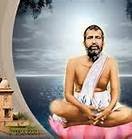The Gospel of Sri Ramakrishna :51.

INJURY TO THE MASTER'S ARM : One day, in January 1884, the Master was going toward the pine-grove when he went into a trance. He was alone. There was no one to support him or guide his footsteps. He fell to the ground and dislocated a bone in his left arm. This accident had a significant influence on his mind, the natural inclination of which was to soar above the consciousness of the body. The acute pain in the arm forced his mind to dwell on the body and on the world outside. But he saw even in this a divine purpose; for, with his mind compelled to dwell on the physical plane, he realized more than ever that he was an instrument in the hand of the Divine Mother, who had a mission to fulfil through his human body and mind. He also distinctly found that in the phenomenal world God manifests Himself, in an inscrutable way, through diverse human beings, both good and evil. Thus he would speak of God in the guise of the wicked, God in the guise of the pious. God in the guise




